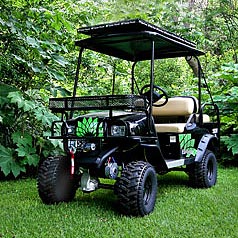BP presents solar-powered electric vehicle to Lakeshore Nature Preserve
BP America Inc., the largest oil and gas producer in the United States and one of the largest investors in alternative energy, is making a gift of a solar-powered all-terrain electric vehicle to the Lakeshore Nature Preserve at the University of Wisconsin–Madison.

A British Petroleum solar buggy was presented to the Lakeshore Nature Preserve on July 7, 2008. The electric utility vehicle is partially powered by the sun.
It was handed over to the preserve today (July 7).
The electric vehicle, equipped with a 48-volt battery system and a 185-watt PV solar panel manufactured by BP Solar at its Maryland facility, will be used to move staff and equipment around the 300-acre preserve. The preserve stretches across more than four miles of Lake Mendota shoreline, from near the Memorial Union Terrace on the east to Shorewood Hills Village on the west.
“The Lakeshore Nature Preserve is delighted to accept this electric utility vehicle from BP,” says professor Ray Guries, chair of the Lakeshore Nature Preserve Committee and chair of the Department of Forest and Wildlife Ecology. “We know from experience that electric vehicles are energy efficient and convenient, and their quiet operation is a big plus for moving around a nature preserve. We are grateful for BP’s support for clean energy as well as their support for the Lakeshore Nature Preserve.”
“BP proudly donates this vehicle to the University of Wisconsin, our longtime partner,” says Patricia D. Wright, vice president of external affairs for BP America and BP’s senior executive contact with UW–Madison. “This vehicle demonstrates our commitment to alternative energy and to harnessing the non-polluting power of the sun. It also represents the ingenuity that is needed from companies and universities alike as we strive to provide traditional and nontraditional energy for the future.”
The “solar utility vehicle,” as BP has dubbed the modified Bad Boy Buggy ATV, has 30 horsepower and provides more than 170 foot-pounds of torque. By contrast, the average electric golf cart provides 25 foot-pounds of torque. The vehicle is capable of negotiating a 40-degree incline. It has room for four passengers, with a load capacity of 880 pounds, and can pull a small trailer loaded with 1,500 pounds. It is for off-road use only and has a maximum speed of 22 miles per hour. BP has donated 21 of the vehicles to parks, nature preserves and universities across the country.
BP has long been a major donor to UW–Madison. Previous gifts have supported, among other efforts, research and graduate students in geology and geophysics in the College of Letters and Science and in chemical and biological engineering in the College of Engineering.
BP America is the largest producer of oil and gas in the United States and one of the nation’s largest energy investors. BP Alternative Energy, launched in November 2005, combines all of BP’s interests in low and zero-carbon energy, including wind, solar, hydrogen power with carbon capture and storage, natural gas-fired power generation, biofuels for low carbon transport and distributed energy for emerging markets.



